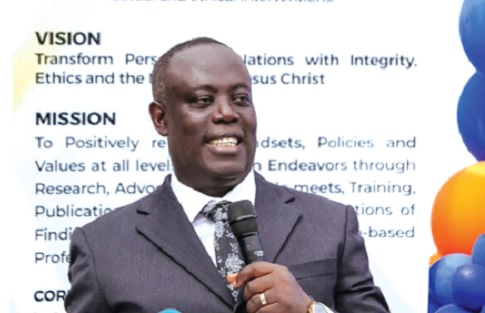There is the need to increase the awareness of cancer and education on its preventive measures to ensure that more people are better informed about the condition.
This would help the general public to have more information about the condition and help save lives through early intervention.
The President of the Frimpong-Manso Institute, Reverend Professor Paul Frimpong-Manso, who made the call, said that would help bridge the gap in cancer care.
“Although the incidence of cancers continues to rise steadily globally, interventions to achieve early detection and favourable treatment outcomes have not matched this rising incidence,” he said.
“Since February 4, 2022, the Union for International Cancer Control has been championing a three-year campaign centred on creating awareness to "Close the Gap in Cancer Care" involving various stakeholders ranging from philanthropists, health organisations and governments.
“This awareness creation drive has been occasioned by the existence of socioeconomic factors and social discriminations serving as barriers to people accessing diagnostic tests for early detection and treatment for cancer,” he said.
World Cancer Day
Rev. Prof. Frimpong-Manso made the call in a statement to mark World Cancer Day, World Cancer Day is an international day marked on February 4, each year, to raise awareness of cancer and to encourage its prevention, detection and treatment.
It is an initiative led by the Union for International Cancer Control (UICC) to support the goals of the World Cancer Declaration, written in 2008.
Rising incidence, widening gap
Rev. Prof. Frimpong-Manso said inequalities with respect to cancer incidence and survival rates continued to widen between and within countries.
He said the World Health Organisation's (WHO) latest reports indicated that cancer was the leading cause of death with about 10 million deaths in 2020.
Also, there is a reported incident of approximately 400,000 children diagnosed with cancer each year, stating that the most common causes of death were cancers of the lungs, colon and rectum, and liver; while cancers of the breast, lung, and colon and rectum account for most of the newly detected cases.
Projected increase
He added that within the next two decades, global cancer burden has been projected to increase by 60 per cent, translating into 30 million new cases this year.
“Low-and-middle income countries such as Ghana may bear the brunt of any upsurge in cancer cases.”
“Much as these interventions may place more responsibility on governments due to the need for legislation, regulation and funding, clinicians, scientists and public health experts are equally expected to further research into population specific risks and targeted clinical interventions for various cancers,” he said.
Rev. Prof. Frimpong-Manso stated that it was thus crucial for countries to implement policies that give the citizens access to screening and early diagnosis, as well as affordable treatment options in managing cancers, emphasising that such outputs could inform health education to foster behavioural change, relevant interventions to promote screening and equitable access to cancer treatment programmes, all in the bid to help curb a potential health crisis.
“Research is needed to help address contextually relevant inequities in order to 'close the gap in cancer care' in Ghana and across the world,” he stressed.

